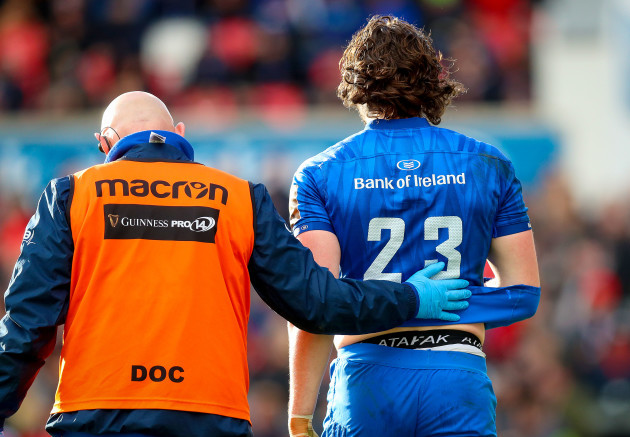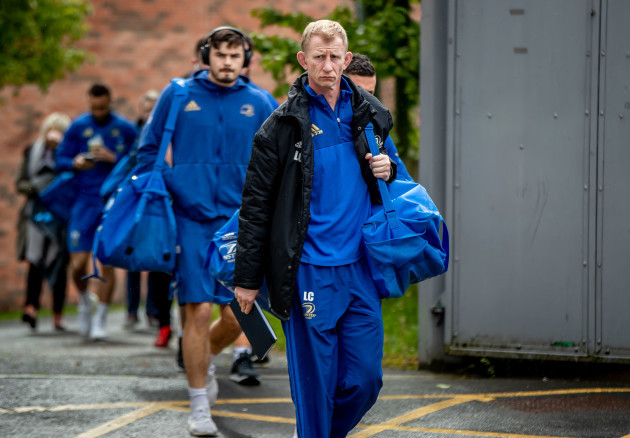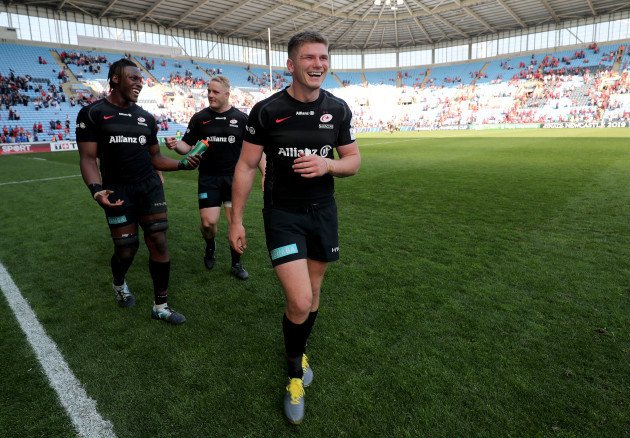Sean Farrell reports from Kingspan Stadium
IF INJURIES ARE not inevitable in rugby, at the least you will find frequent foolishness if you go into a game assuming your team will escape one.
That knowledge is what led Leo Cullen to make 19 changes to his matchday 23 even though Leinster had three weeks to work with between Champions Cup semi-final and final.
Barry Daly was the unfortunate man to sustain injury during the loss the Ulster in Belfast on Saturday, a collarbone problem that will surely leave him to ponder the 2019/20 season.
Aside from the versatile back, Fergus McFadden could well have a disciplinary committee to answer to, but among the positives was another fine display from Ross Byrne, who was called out of the firing line alongside Jack McGrath before five minutes of the second half had elapsed.
Over the years, the IRFU’s player management system has pushed provinces to step away from what was once the accepted wisdom of match fitness. In the modern game, with so much data tracked and so many eager young pros to run as opposition in training, teams can ramp their players right up to speed in a controlled environment, with a massively reduced chance of injury compared to a full-on fixture.
“The way we’ve adapted training is very different to the way that would have been in the past,” said Cullen after ending the regular Pro14 season with a 14-13 loss in Belfast.
“Guys are used to it, the season, there’s lot of high-pressure games for lots of players, so they’re used to that building up to ‘this’ level of performance,” the head coach said while miming peaks and troughs on a graph, “coming off, and building back up again, coming off, building back up.
That’s the cycle they go through over the course of a season so they’re used to it at this stage.”
He adds: “In terms of the information shared on guys that we have, we want guys to not be stumbling over (the line) at the end of the season, we want them to be going as strong as ever at the end of the season.
“Even last year, they played that sequence of games which was: a final in Europe, semi-final and the final of Pro14, have a weekend off and then travel to Australia and play a three-Test series.
“They are able to manage that pretty well, A lot of guys played three Tests. That is important as well. It is not like this stumble on out at the end of the season and the guys are in bits, being strapped together.”
Cullen points out that each club’s situation is different and admits teams in England and France have the chance to build greater cohesion in their groups as a trade-off with the potential for fatigue.
A week after beating Munster in Coventry, Saracens did not take up the chance to rest their front-liners when they returned to the Ricoh to beat Wasps 14-31 with Owen Farrell, Liam Williams, Alex Goode, Maro Itoje and Billy Vunipola all in tow from the start. They have Exeter Chiefs to deal with next weekend, but both sides already have home semi-finals confirmed, so Mark McCall probably won’t feel the need to throw the kitchen sink at the leaders this time around.
Leinster’s marquee players had their rest in the wake of the win over Toulouse. So this week will see them back into a full training load before the final approach.
Before the unusual setting of St James’ Park it will be “a normal week”, Cullen says. Though there is nothing ordinary about the side standing between Leinster and a record fifth European Cup.
“We need to understand the threats that Saracens pose, they are so different to the threats we had in our semi-final against Toulouse. Because they are at complete opposite ends of the spectrum.
“Toulouse are built on all-out attack in many ways, whereas Sarries are built on all-out defence and pressure. It doesn’t mean one is right or one is wrong, that is just the way the teams are set up.
“The challenge is very different and we need to understand the threat of this team we are playing, just like every other week the team we play.”
Subscribe to our new podcast, The42 Rugby Weekly, here:



